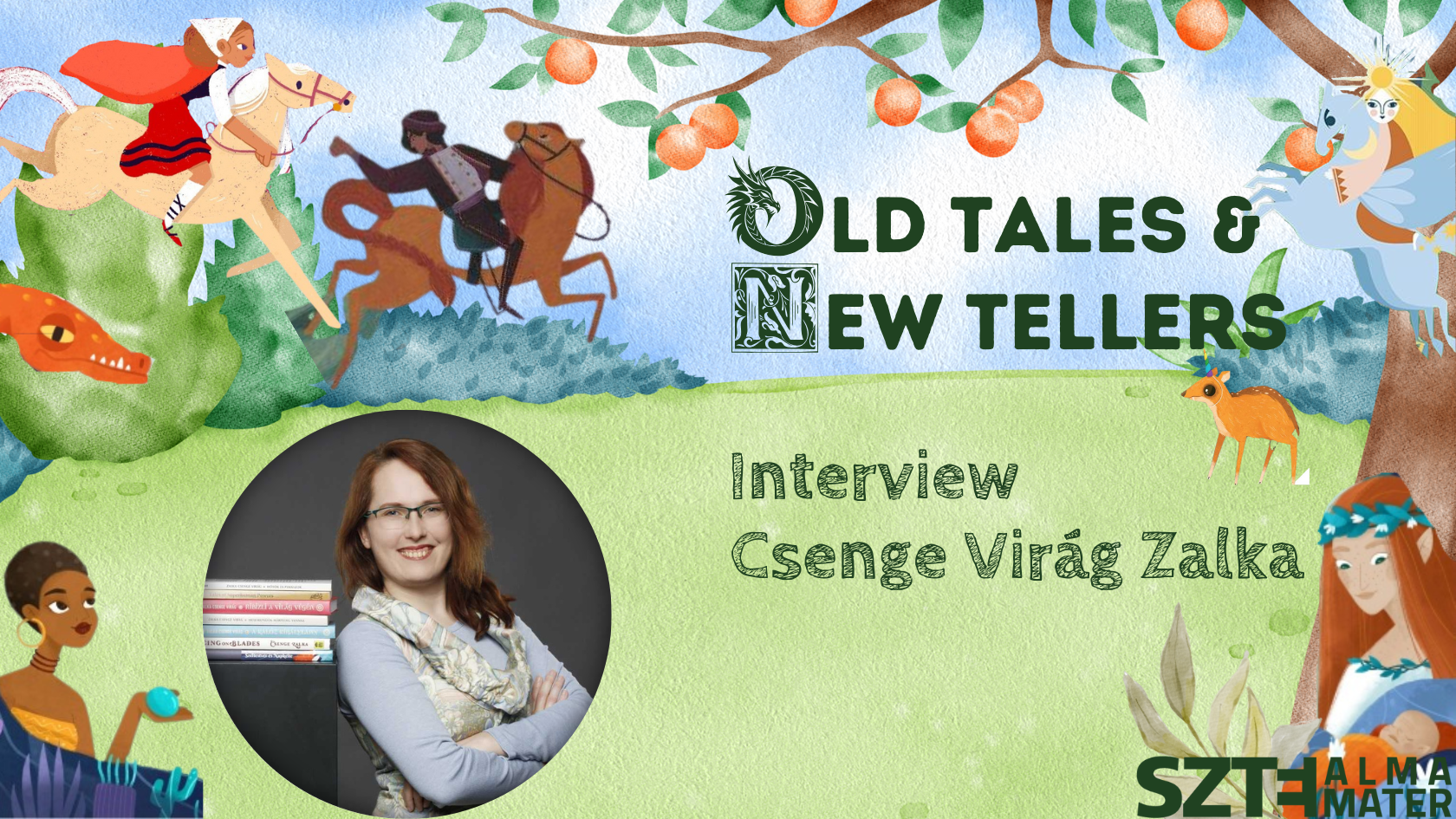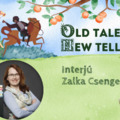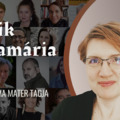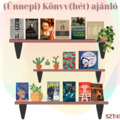A very special guest is coming to Szeged on the 30th of April: Csenge Virág Zalka, internationally renowned storyteller, author, and cultural researcher, who will be welcoming audiences with three exciting events. At noon, she’ll lead an English-language workshop, guiding participants into the world of contemporary storytelling. In the afternoon, she’ll meet children for a reading event, and in the evening, a unique book club will close the day, where we’ll talk with her about A varjú herceg (The Raven Prince). In the following interview, Csenge talks about her profession, the power of stories, and why it’s still important today to retell traditional tales.

Once upon a time… if you had to introduce yourself like this, how would you continue the story?
Once upon a time, there was a girl who was found by stories. Wherever she went, new and exciting tales followed her, and they were so unique and fascinating that she simply had to share them with others. And so, she became a storyteller.
How did you find storytelling as a profession? Do you remember the moment you first felt this was your path?
Actually, I felt like I wanted to tell stories since I was a child, but I didn't know that such a profession existed. So first, writing found me; I would tell stories aloud to friends and acquaintances. It was during university that I discovered there were professional storytellers. I can tell you the exact date: it was June 25, 2006. I was sitting at my computer, reading about storytellers from around the world (on the International Storytelling Center’s website), and this wave of awareness ran through me: THIS is my profession.
Stories have been with humanity for centuries. What do you think is their role in today’s digital world?
Oral storytelling creates a kind of connection between teller and listeners that nothing else can replace. It’s direct and interactive, a shared, one-time-only experience of quality time where both sides are fully, actively present. When a story comes to life in front of an audience, it’s always for them, right there in that moment. And regardless of digital possibilities, people have a huge need for real, face-to-face connection.
Your workshop also focuses on how traditional stories work in a contemporary context. What makes an old tale stay alive?
By telling it as something alive. Not just by speaking it aloud, but by immersing ourselves in the story. For me, storytelling is not reciting, and it’s not about preserving language; I tell stories because I genuinely enjoy it, and every tale I share is one I find exciting and interesting. Back in their time, traditional storytellers spoke in the language of their communities. You don’t need a trained dialect or archaic vocabulary to be a good storyteller. It’s all about authenticity and the intention of passing on a story.
What do you consider when adapting an old story for a modern audience?
There are many aspects to this. First of all, I make sure the story is well-rounded, exciting, and interesting; no matter how useful or instructive or authentic I think something is, If it doesn't light me up, then it's all for naught. Secondly, when I tell stories that aren’t Hungarian, I think it’s important to learn as much as I can about the story’s background and its culture, so I can appreciate the small details. And it’s also important to me to choose stories whose values I can personally relate to. I feel my primary responsibility is toward the audience: I want to give them something I truly believe in, something whose message I also believe in. (That’s why, for example, I don’t tell stories that portray abuse or exclusion in a positive light.)
You tell stories in several languages. Do you notice differences in how stories affect audiences in different cultures?
Yes, every culture has its own stories, as well as its own storytelling occasions and habits. Even Hungarian stories are received differently abroad, though usually with great curiosity and enthusiasm. It’s always fascinating when our everyday fairytale elements - like seven-headed dragons or "kacsalábon forgó vár" (direct translation: castle spinning on duck legs, meaning: fairy-tale castle) - suddenly become exotic. But you don’t have to go far for differences: I often tell stories in Szeklerland (in Romania), and there, children audiences are much more interactive, louder, and freer in expressing their excitement than audiences in Hungary. They interrupt the stories, comment on the characters’ choices, and cheer at the exciting parts. I’ve had similar experiences in Spain - they joined in the singing even if they didn’t understand the lyrics.
You’re actively involved in the work of the Világszép Foundation. What does the social role of storytelling mean to you, especially in the lives of children?
The Világszép Foundation’s storytelling programme (which I’ve been running for six years) brings the experience of bedtime stories to children living in residential homes without their families. It’s not a class or therapy session; it’s simply about these children getting to experience an adult sitting down with them in the evening and telling them a story. A story they get to choose. These magical moments tell them - in the language of stories - that every challenge can be overcome, that there’s always help, and that even the smallest wanderer can become a hero. And in that moment, it also means connection, attention, and quality time for the children. I believe this, and not just in relation to children living in orphanages: fairy tales carry important messages and bring people closer together. And today, we need that more than ever.
Why should people come to the events on April 30?
Because each of them will be interactive in its own way, which means you’ll be able to ask anything and talk about anything you’d like! Of course, I’ll be telling stories as well, but I’m already curious to see what topics participants will bring. I can’t wait to meet you all!
The programmes mentioned above:
A bejegyzés trackback címe:
Kommentek:
A hozzászólások a vonatkozó jogszabályok értelmében felhasználói tartalomnak minősülnek, értük a szolgáltatás technikai üzemeltetője semmilyen felelősséget nem vállal, azokat nem ellenőrzi. Kifogás esetén forduljon a blog szerkesztőjéhez. Részletek a Felhasználási feltételekben és az adatvédelmi tájékoztatóban.



